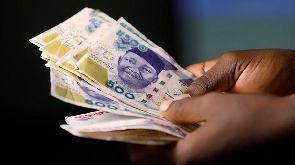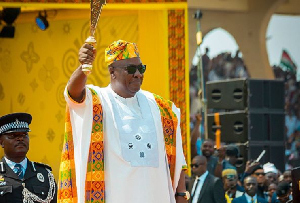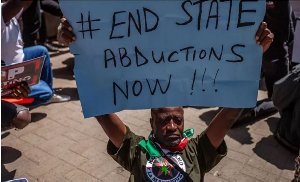Nigerians are hoarding cash again amid memories of a failed official campaign around this time last year to demonetize high-value naira notes.
Many ATMs have been unable to dispense cash and bank branches have cut daily cash-payment limits to either 5,000 or 10,000 naira ($11.24) from 20,000 naira to deal with the shortages that first emerged in October but have worsened this month ahead of the festive season.
Point-of-sale operators have increased charges for dispensing cash by as much as three times this month, citing an inability to access banknotes.
The Nigeria Labour Congress, the country’s largest workers’ union, said in a statement earlier this week that the shortages are “undermining confidence of the public in the banks and may discourage the citizenry from participating actively in banking.”
It also urged the government to take steps to ease the cash crunch and avoid a repeat of the economic hardships caused by shortages from the botched demonetization program, or face protests.
‘Excruciating Conditions’
“Fresh in the minds of every Nigerian are the excruciating conditions that we were all subjugated to as a result of the last cash crunch,” Joe Ajaero, the union’s president, said in the statement. “The sorrow that botched exercise foisted on us is not what Nigerians wish to witness again in one year.”
The Central Bank of Nigeria on Thursday said that it’s investigating some lenders, who it alleged were collaborating with unauthorized cash vendors to hoard the naira.
The central bank began replacing old high-denomination naira notes with redesigned ones in December 2022. It had planned to end their use from Feb. 10 until a court ruled that the bills should remain in circulation until Dec. 31 after the program was challenged by state governors.
Last month, the bank said it would allow the old banknotes to remain legal tender indefinitely, days after finding that the seeming cash scarcity in some locations was “due largely to high-volume withdrawals from the CBN branches by deposit-money banks and panic withdrawals by customers from the ATMs.”
The demonetization program introduced by former Governor Godwin Emefiele to mop up excess liquidity, stymie illegal activity and promote electronic payments imposed significant negative shocks on the economy in which about 90% of all transactions are done in cash.
Snaking queues outside ATMs and bank branches became a common sight, while tasks such as riding the bus or buying food became an ordeal. Private-sector activity in February and March contracted as companies reduced output and cut jobs.
It also led to an increase in the use of Nigeria’s digital currency, the eNaira. The digital currency in circulation rose more than threefold to 10.26 billion naira in the third quarter from 2.55 billion naira at the end of 2022, while physical notes and coins declined 9% to 2.75 trillion naira, the regulator said in a report on Thursday.
Business News of Friday, 22 December 2023
Source: bloomberg.com

















